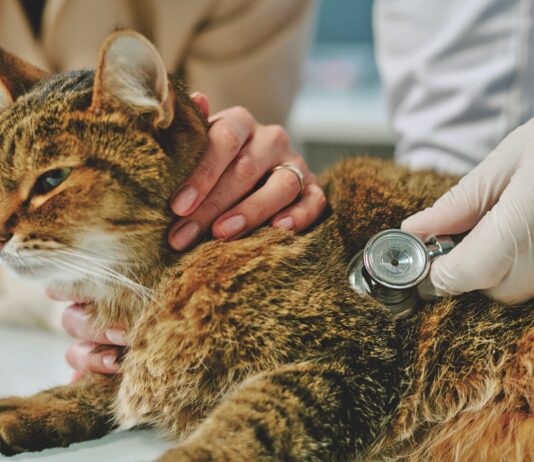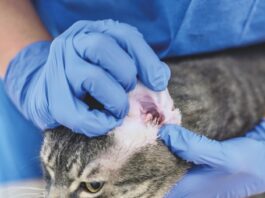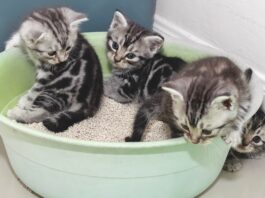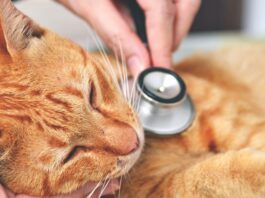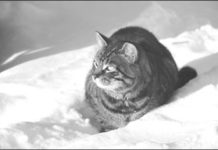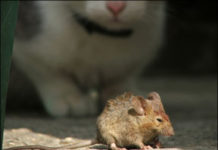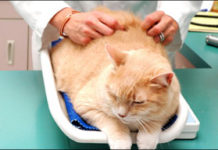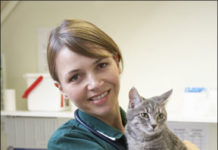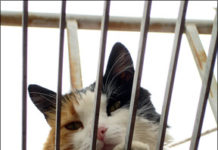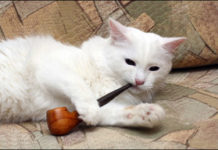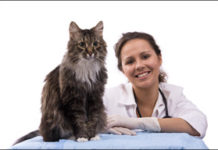Hypothermia: A Winter Danger
Cats whose breed developed in frigid areas of the world are likely to tolerate cold weather better than cats whose origins can be traced to more temperate regions. But even the fattest, furriest Maine Coon will have only a slight edge over a trim, thin-coated Siamese when it comes to prolonged exposure to the biting winds, ice, snow and sleet that come with winter. Indeed, any cat that is left outside for extended periods of time when the temperature is below freezing - not to mention any poor creature that happens to tumble into an ice-cold pond - will be at risk for a potentially deadly drop in body temperature.
Lungworm: Tricky To Diagnose
Yearly, thousands of cats are brought to veterinary clinics throughout the U.S. showing the telltale signs of respiratory distress: labored breathing, chest constriction, wheezing and coughing. In the vast majority of cases, the animal will be diagnosed with asthma, a mechanical constriction of the airways, or bronchi, the narrow network of tubes that lead directly from the trachea to the lungs. The narrowing of the airways occurs when a cats immune system overreacts to the presence of an allergy-producing substance, such as cigarette smoke, dusty kitty litter or pollen and responds to the presence of the allergen by releasing stimulants that cause a swelling of the tissue (mucous membrane) lining the bronchi.
The Veterinary Exam: Schedule It!
Luckily, your six-year-old cat, Dottie, has never been sick. Nevertheless, youve made a point of taking her to her veterinarian for a routine physical exam twice a year. Youre doing the right thing, says William Miller, VMD, medical director at Cornell Universitys Companion Animal Hospital, and all cat owners would do well to follow suit. "Its a very good idea to have every cat undergo a twice-yearly exam," he says. "This is especially true for geriatric cats - those that are age 10 and older - and for animals that spend time outdoors and are exposed to a host of feline diseases." A thorough checkup should also be obligatory for any new cat that is brought into a household and for kittens when they reach one year of age.
Osteosarcoma: A Serious Diagnosis
Thanks to the numerous advances in veterinary medicine, many of the cancers to which cats are susceptible are now controllable, sometimes curable - and even preventable (in the case of mammary cancer, for example). This does not always hold true, however, for osteosarcoma, a highly destructive feline bone cancer for which there is no known cure unless it is detected early. Once osteosarcoma has invaded a cats body, the best that the animals owner can hope for is early diagnosis and management of the disease. If the cancer is confined to a limited area of an affected cats body, successful treatment will almost always involve surgical excision - the amputation of a leg, for example, or the removal of a part of the animals jawbone - in which case the cat may go on living for years.
Short Takes: October 2010
Feline leukemia (FeLV) and feline immunodeficiency virus (FIV) are both serious pathogens of cats that often result in lifelong infection. Routine testing - as well as testing of clinically ill cats - is recommended, and is usually performed by using in-clinic test kits. For FeLV, these assays detect a viral protein, whereas a virus-specific antibody is detected for FIV. A new test system, Anigen Rapid FIV Ab/FeLV Ag test kit is now available on the European market. These investigators examined the diagnostic sensitivity and specificity of this new test kit on 300 samples using western blot as the gold standard for FIV infection, and polymerase chain reaction for FeLV infection; in addition, results were compared to those attained using the most commonly-used kit made by IDEXX (SNAP Combo).
Curing Ringworm in a Shelter
Ringworm (dermatophytosis) is a superficial - yet highly contagious - fungal skin infection that affects many animals, as well as humans. In healthy cats, it is generally self-curing, and should resolve over the course of several months. However, treatment will shorten the course and help to prevent it from spreading, including to humans. This is particularly important in a shelter environment where infection can negatively impact adoptions, and is a risk for staff and visitors.
Why Is Your Cat Coughing?
A wide variety of irritants - from minor and transient to severe and indicative of a major health problem - can affect any portion of the feline respiratory system, whose purpose is to warm and humidify inhaled air, deliver oxygen to the lungs, and expel carbon dioxide and other waste gases. A complex pathway of tracts and organs, the upper respiratory system consists of the nose; two nasal passages; the nasal cavity (a hollow structure surrounded by air-filled spaces that are situated just above and below the eyes); and the pharynx (a cavity behind the mouth) that opens, via a passageway called the larynx; to a tubular structure, the trachea, a flexible tube commonly referred to as the windpipe.
Diagnosis: Feline Food Allergies
Its always been a priority to feed your cat the most nutritious diet available, even if that means paying more for premium cat food. But even the best of foods can contain an ingredient to which she has developed an allergy. If thats the case, youre likely to witness a change in your cats behavior and health. Most noticeably, shes likely to be bothered by intermittent or constant itching.
Compounding Medications: Helpful
Some cats are simply perfect patients. They sit calmly for nail trims and they let you look inside their mouths and even brush their teeth, purring all the while. Other cats, however, are not so accommodating. You merely think about trimming their nails and they disappear in a flash. Getting a pill into them requires protective gear and strong determination. Most cat owners know that there are a lot of different ways of getting medications into cats, but the desperate owners of hard-core pill haters sometimes need to go the extra mile to find a solution.
Fluid Therapy at Home: Possible
Chronic renal failure in a cat occurs when 75 percent or more of the animals healthy kidney tissue has been destroyed and replaced by scar tissue. As a consequence, the two kidneys are unable to carry out their function of removing metabolic waste from the blood that is pumped through them. Although chronic renal failure is incurable, an affected cats life may be extended significantly by the close monitoring of its hydration status and the routine replenishment of its body fluid levels.
Ask Elizabeth: September 2010
Im very confused about feeding my cat. Feather is a healthy 14-year-old Siamese companion. Over the years Ive offered Feather a variety of products from different pet food manufacturers - everything from Tender Vittles to dry grocery store brands to fancy little pop-top cans. Whatever I scoop into her bowl, Feather will eat it.
Ringworm: A Hungry Fungus
Commonly referred to as ringworm, feline dermatophytosis is a fungal infection that is frequently observed in cats. The condition occurs worldwide, most commonly in warm, humid climates that are hospitable to the peculiar type of fungus that causes it. In the U.S., the disorder is especially problematic year-round in the deep South, says William Miller, VMD, a professor of dermatology at Cornell Universitys College of Veterinary Medicine, and its prevalence can rise markedly in cooler areas of the nation with the arrival of hot and muggy summer weather.

